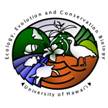| Thursday, April 18th, 2024 |
|
|
Workshop Photos
Palau
The 2005 Palauan Environmental Science Project was designed to extend the goals of the GK-12 fellowship program to an international venue. If teachers and scientists are to advocate and teach science using the process of inquiry, then it is important for these teachers and scientists to experience the process of learning through inquiry themselves. The intent of the proposed project in Palau was to provide such an opportunity to all participants. By planning and presenting a three-day workshop to expose Palauan educators to the same kinds of training in teaching through inquiry and environmental content knowledge that Hawaii teachers had been gaining through participation in the GK-12 program, fellows gained an opportunity to put their own pedagogical training into practice by modeling inquiry-based teaching.
An additional objective of the collaborative project in Palau was to provide participating GK-12 fellows from Hawaii an opportunity to learn how their knowledge of science and education can be incorporated and applied within a different cultural setting. By visiting sites of interest with local resource managers, fellows, and many of the teachers, had an opportunity to experience environmental research in areas they had never visited. These experiences, along with the workshop, allowed for facilitation of partnerships between Palauan teachers and resource managers, as well as fellows and resource managers.
The potential for benefits to multiple stakeholders including fellows, educators, and local resource managers was one of the most exciting and challenging aspects of the project, and the ambitious goals were not completely fulfilled. Although the goals of increasing environmental awareness and facilitating partnerships between Palauan educators and local scientists were adequately met, teachers in Palau did not appear to gain significant understanding related to teaching science as inquiry. Challenges faced by the fellows in preparing and presenting the workshop included cultural differences, and uncertainty related to those differences, and working with large groups. Despite these challenges, response by all participants to the Palauan Environmental Science Project was positive. Many of the teachers were able to identify environmental projects they could conduct with their students, and had developed contacts with local resource managers who could aid them. The fellows cited many personal benefits, including improvement of their own teaching skills, a new perspective on environmental issues after experiencing them in the perspective of a different culture, and establishment of relationships with Palauan resource managers.
|
| Contact Information: Dr. Kanesa Duncan, Program Coordinator; kanesa@hawaii.edu |














